Fall Premieres 2015: The Daily Show with Trevor Noah
By the end of his run with The Daily Show, Jon Stewart had been both credited by some with doing more than anyone else to save American politics and journalism, and damned by others for doing more than most to destroy the very fabric of democracy. How does Trevor Noah compare? A group of experts on political entertainment and/or comedy discuss his first week as host.
First, some quick introductions:
- Jonathan Gray (University of Wisconsin-Madison) co-edited Satire TV: Politics and Comedy in the Post-Network Era and is author of Watching with The Simpsons: Television, Parody, and Intertextuality.
- Amber Day (Bryant University) is author of Satire and Dissent: Interventions in Contemporary Political Debate.
- Chuck Tryon (Fayateville State University) wrote for many years at his blog The Chutry Experiment on political television, and is author of the forthcoming Political TV.
- Geoffrey Baym (Temple University) is Professor Colbert himself, having written many of the canonical treatments of Colbert, and is author of From Cronkite to Colbert: The Evolution of Broadcast News.
- Ethan Thompson (Texas A&M-Corpus Christi) co-edited Satire TV: Politics and Comedy in the Post-Network Era and is author of Parody and Taste in Postwar American Television Culture.
- Nick Marx (Colorado State University) is co-editor of Saturday Night Live and American TV and is currently editing a reader on comedy studies.
Jonathan Gray:
With each of the other major change in hosts of the various late night shows in the last few years, the new host has been given considerable scope to change the show considerably. It may still be called The Late Show, therefore, but the set’s different, the band’s different, Colbert’s not doing Top Ten lists, Rupert and Biff are gone, etc. What struck me immediately about The Daily Show with Trevor Noah, therefore, was the same old voice announcing the date, the camera swooping over a fairly familiar looking set, while the same ol’ theme song played. Interestingly, then, while a lot has been made about whether Noah can “replace” Jon Stewart, in fact he seems only to have been asked to fill the chair and role of convenor, as Jon’s show, style, and feel are very much still in play. This extends even to Noah’s comic style at time: I’ll discuss a few differences, but so much of his delivery, his play with the camera, his faces at the on-screen bad punny section titles, and so forth felt very “Stewartian.” Even the crappy, unfunny, politically sterile segment about police racism and brutality on Wednesday night’s show feels like the junk that Stewart’s lesser staff members phoned in some times.
I wonder, though, how much of this continuation is a bridging strategy. I think here of the advice I give to grad student lecturers, to teach the regular professor’s class as the professor did, and to leave changes to the second time they teach it. Maybe Week 10 or Season 2 of Noah’s Daily Show will look as different from Stewart’s Daily Show as Colbert’s Late Show is different from Letterman’s, but for now it’s a shrewd move with a not-entirely-popular choice for replacement to keep the machine running rather than reinventing it.
And run it did. Noah is good at this job. He’s funny, he mixes groany dad jokes with edge with skill, as did Stewart. He has good chemistry with the camera. He exudes an intelligence becoming of the role. Nor is he just aping Stewart completely: his own segments seem to move quicker, his delivery and pacing crisper; his relative youth means he doesn’t need to adopt the patrician mode that Stewart did increasingly; and like John Oliver, he can use his non-Americanness to great comic and satirical effect. I was not one of Noah’s many detractors, but I still expected far less than he provided in those first three nights.
Still, though, he’ll need to improve with interviews to keep me from turning off the TV half way in. While the experienced Colbert was booking Jeb Bush and Joe Biden in his first few days, The Daily Show’s bookers either lost their mojo completely, or were savvy enough to give Noah training wheels, opening with Kevin Hart then moving to the founder of a new dating app. Even Chris Christie was a wise first “real” interviewee, since one can count on Christie to know the audience and show and move the interview himself. Even then, in the interviews Noah has been feckless, clearly out of his depth, starstruck, wooden, and a far, far cry from Stewart. Admittedly, Stewart was a superb interviewer, and it’s early days, but the beauty of The Daily Show with Jon Stewart was the two shows in one — critique of the news, then an interview with bite — and unless Noah is a quick study, and as much as the producers may have kept a lot of the old Daily Show, the new one may be only half its former self. I’ll definitely stick around, though, and I don’t begrudge Noah the need to improve.
Amber Day:
This first week of Trevor Noah’s tenure on the Daily Show has had its ups and downs, but I do think that the host shows a good deal of promise.
I agree with Jonathan that the interviews have been disappointing. In particular, the first two interviews both began with what seemed like a pre-rehearsed (or pre-agreed upon) opening joke that fell so flat as to be almost unintelligible (Kevin Hart’s supposedly disappointing gift of ties and the Whitney Wolfe conceit that interviewer and interviewee were on a date). Like Jonathan, I may well end up turning off the program half way through (or more likely, cherry picking segments to watch on the Comedy Central website), though I do acknowledge that being a good interviewer is a skill that is entirely different from delivering a tight monologue, and one that will almost certainly take some time to develop.
On the other hand, I think that the comedy portions of the program this past week were well done. Noah’s self-deprecating bits about the perils of trying to fill Jon Stewart’s shoes struck the right opening note, while momentum continued to pick up as the week progressed. Here, the one segment over which I disagree with Jonathan was the correspondent piece about racial profiling and police brutality. I thought the segment did a very good job of highlighting the radically divergent ways in which the majority of white Americans versus black Americans view the police force, while very deliberately allowing the spokesperson for a police anti-bias training program to make a case for why such a program is necessary and what it is meant to accomplish, a message that slipped through in the background while the correspondents clowned in the foreground. Though it was certainly gentle, I think it was a form of advocacy journalism tailored for an exceedingly touchy subject. I happened to be watching that episode with my mother-in-law, whose political views are widely divergent from my own, but it felt like a conversation starter that we were both comfortable with, while it did still have substance.
The other highlight of the week for me was the extended story on Donald Trump being akin to an African president, detailing his striking similarities to notorious military strong-men and megalomaniac dictators like Gaddafi or Amin. Though Trump is certainly an easy target, the piece allowed Noah to use his own background and knowledge to provide global context for the American political race, while also producing a very funny segment.
Going forward, Noah will, of course, have to grapple with the ins and outs of American party politics, but he would do well to continue to draw liberally from his strengths: an international perspective, as well as a heightened sensitivity to contemporary race relations. If he can manage to bring some of that savviness to his interviews, he will have it made.
Chuck Tryon:
During the opening monologue of his debut episode on The Daily Show, Trevor Noah promised to uphold the legacy of Jon Stewart by continuing the “war on bullshit.” For those of us who became accustomed to Stewart’s relentless attacks on cable news, however, Noah’s contributions actually look quite a bit different, at least so far. Thus far, Noah has generally offered a much more genial perspective, one that draws on his experiences as a non-U.S. native to denaturalize some aspects of American political discourse rather than focusing excessively on cable news (although he did offer a mildly humorous critique of cable news’s tendency to focus on distractions such as “pumpkin spice” season). That being said, like Jonathan and Amber, I also see plenty of room for Noah to grow into the role of Daily Show host and to adapt the format to his comedic strengths, in much the same way that Stewart refocused the show away from Craig Kilborn’s sterile, apolitical humor.
This “outsider” status was powerfully displayed in the inspired segment in which Noah compared Donald Trump to a laundry list of African dictators. Like Amber, I appreciated this segment, in no small part because it provided a more global perspective on American politics, but also because it brought a fresh perspective to the Trump parodies, which have become overly obvious in recent weeks. Other segments were somewhat less successful. I was somewhat ambivalent about the police brutality sketch, in that its politics seemed somewhat incoherent to me, but that’s likely a product of the writers finding their stride, rather than any limitations on Noah’s part. The “Panderdemic” segment also showed promise, as Noah worked to pick apart the ways in which politicians seek to appeal to specific voters, often in disingenuous ways.
Perhaps the biggest concern about Noah has been his performance during interviews. But it’s worth remembering that Stewart, especially during his early career, seemed equally star-struck during interviews. And while I’m no fan of Chris Christie, Noah was probably better served by taking a relatively genial tone with him. In fact, Noah did offer a subtle pushback against one of the common tropes of conservative politics, in which presidential candidates campaign against “the government,” even though they are part of that government. He also managed to tease out some of the absurdities of Christie’s draconian immigration policy. These moments suggest that Noah may be a quick study on American political discourse, and I’m willing to give him time to develop his skills as an interviewer while waiting for Colbert to start.
Ultimately, I think Noah will grow into his role as host of The Daily Show. It’s unfair at this stage to hold him to the high standards established by Jon Stewart, who seemed to become the political conscience of cable television over the last few years, but given time, I’m hopeful that Noah can bring a unique perspective to the fake news genre.
Geoffrey Baym:
I want to build briefly on Jonathan’s suggestion that Trevor Noah has kept “the machinery running” through his first week. While it is right to consider what changes Noah will make to the program as he settles in to the role, I’m also quite interested in the power of the machine to operate as designed. Or to put the point differently, we’re seeing what I would characterize as the institutionalization of the form. When so many of us began paying careful attention to The Daily Show more than a decade ago, it seemed like something unprecedented and risky – a novel mechanism for engaging with and interrogating the public political conversation that had more to do with the particular vision and talents of the host than it did the power of formal convention or institutional lineage. And the host himself long insisted that he was an institutional outsider, a jester throwing spitballs, rather than the opinion leader and influence broker he so clearly became. That of course is the point of the long-running joke: “From Comedy Central World News headquarters in New York, this is The Daily Show with Jon Stewart.” Unlike those long-established and institutionally entrenched news outlets on the other channels, Comedy Central of course had no “world news” operation, nor a “headquarters” where nationally significant command and control decisions could be made.
Notably, that intro line remains – the only difference being the last two words (“with Trevor Noah”) – as does the swooping camera motion, the spinning globe, and the theme music. All of this suggests that the joke has taken on new complexities, it seems now to fold back in on itself. Like the institution of nightly news it long imitated, The Daily Show truly has become more than the personality and skills of its host. It is an institutional product – conceptualized by a team of producers and writers, governed by production conventions and audience expectations, and located in a particular cultural milieu. It may have a new set, new font, and a new graphics package, but those are the same kind of cosmetic changes that all news operations make periodically, just as they bring in new anchors and new correspondents from time to time. Certainly, Noah’s personality and interests will begin to shape the content. Chuck and Amber are right that the Trump-as-African-Dictator gave us a glimpse at the more global and ethnically nuanced discourse most of us are expecting to see from Noah. And of course, his interviewing skills are far from where they’ll need to be. But through a wider lens, this Daily Show is remarkably like the last Daily Show (or the one that John Oliver hosted while Stewart was on leave directing Rosewater), and that continuity is for me the major take-away here.
Finally, there are important linkages to be made between the institutional consistency of The Daily Show and the work that Colbert (and Stewart apparently) are doing on CBS. After nearly a month on air, the Late Show looks a lot like a more grandly theatrical, if perhaps slightly less subversive, Colbert Report. Just the other day, John Oliver sat with Colbert for an interview, with the two explicitly positioning themselves as former Daily Show correspondents. Oliver, of course, has taken the genre of news parody in a new direction on his HBO show Last Week Tonight, devoting 18 minutes per episode to deconstructing often obtuse public problems. Meanwhile, back on Comedy Central, Larry Wilmore (formerly The Daily Show’s Senior Black Correspondent) is still holding on with his panel discussion program, The Nightly Show. Scholars of TV and political communication have long been looking for “The Daily Show effect,” and finally I think we can identify one. Jon Stewart’s show spawned numerous copycats, both in the US and around the world, but more importantly, it has seeded the landscape of political television and created a new kind of media institution while doing so.
Ethan Thompson:
A few minutes into Trevor Noah’s first interview with Kevin Hart it hit me, and I felt oh-so-stupid for not realizing it sooner: the shift from Jon Stewart to Trevor Noah is first and foremost a generational shift.
Stewart was 37 when he started back in 1999. Have you seen a photo of him recently? Noah is now just 31. Stewart’s departure was a chance for Comedy Central to reset the show with a new host who might appeal to a more youthful demo. The olds will keep tuning in anyway, and if Noah isn’t quite suited to their (my) tastes, there’s always Oliver, Wilmore, Maher, Colbert, and/or Myers to queue up on the DVR or switch the channel to later. The Daily Show may be the house that Jon Stewart (re)built, but Daniel Tosh has done more for Comedy Central in recent years, and I expect that that is the audience the network hopes to attract. I wish them luck.
I could think of at least a half dozen people I would have rather seen taking over the anchor spot, but that’s because I was thinking of established people in the post-Boomer/Generation X cohort. Dumb me, and smart Comedy Central. I thought Noah’s first week of programs was solid. He has the presence and personality to carry the show as host, and the various correspondent pieces showed that the program can sail on without Stewart’s guiding hand. I’m glad that Comedy Central is investing in Noah as a host who might cultivate another generation of satire fans.
Noah’s biography is compelling and much has been said about the potential his global perspective might bring to the show. This amorphous “global” perspective was rightly ridiculed on his first show. Still, the standout piece of the first week for me (and apparently the others writing here!) was Donald Trump: America’s African President. Whether or not this was a product of Noah’s global perspective, it was both meaningful and funny.
Television satire, especially the fake news variety, is expected to live and die by the personalities of the performers. Ever since Chevy Chase transitioned from Weekend Update host to movie star after the first season of SNL, fake news has been a springboard, with Colbert’s ascension from Daily Show correspondent to the Colbert Report to his CBS show the corresponding bookend. Stewart’s tenure is an anomaly.
The truth, of course, is the other writers and producers are largely responsible for making the show funny and meaningful on a consistent basis. I hate to take too much credit away from Noah, because I do think he has done a good job and it would be a different show without him. However, I think what Geoffrey Baym describes above as the institutionalization of news satire may ultimately be most interesting to consider. Comedy Central can choose a youthful host without a track record because the form has gelled enough that the program is not dependent upon the host the way it once was. There won’t be anything revolutionary about Noah’s Daily Show the way Stewart’s once seemed. The form, and not just the viewers, have matured.
Nick Marx:
Geoffrey’s description of the “institutionalization” of satire television and Ethan’s observation about generational shifts echo a lot of what I thought about the Stewart-to-Noah transition before last week–that The Daily Show has more or less become Saturday Night Live at this point. That’s intended neither to slight nor compliment either show, but to highlight how both have been integrated into political, industrial, and social discourses beyond the programs themselves. Noah’s hiring (like that of SNL’s Sasheer Zamata, Leslie Jones, or short-lived Daily Show correspondent Michael Che) was less about late-night transitions than it was about race, gender, and televisual representation. It’s been heartening to see Noah, then, arrive in Stewart’s chair with little else around him changed and instantly shine.
Conversely, I was often much more appreciative of the way Stewart’s Daily Show shaped broader public deliberation about important topics™ than I was of his on air presence (good riddance, exaggeratedly-Jewish-Jerry-Lewis voice!). Noah seems to be, at least so far, a much more conventionally funny and likable stand-up comedian. I expect that we’ll see a lot more bits rooted in Noah’s race and nationality (like the Trump-as-African-dictator segment), and I hope the show will continue experimenting with correspondent segments in act one, or even entirely interview-free episodes. Like Colbert’s Late Show, The Daily Show is clearly still struggling to find a new voice while paying proper homage to its predecessor. Fortunately, it’s also got the charismatic ringleader to find that voice quickly. Here’s to hoping Noah doesn’t jump ship after seven or so seasons to make buddy comedies with Will Ferrell.

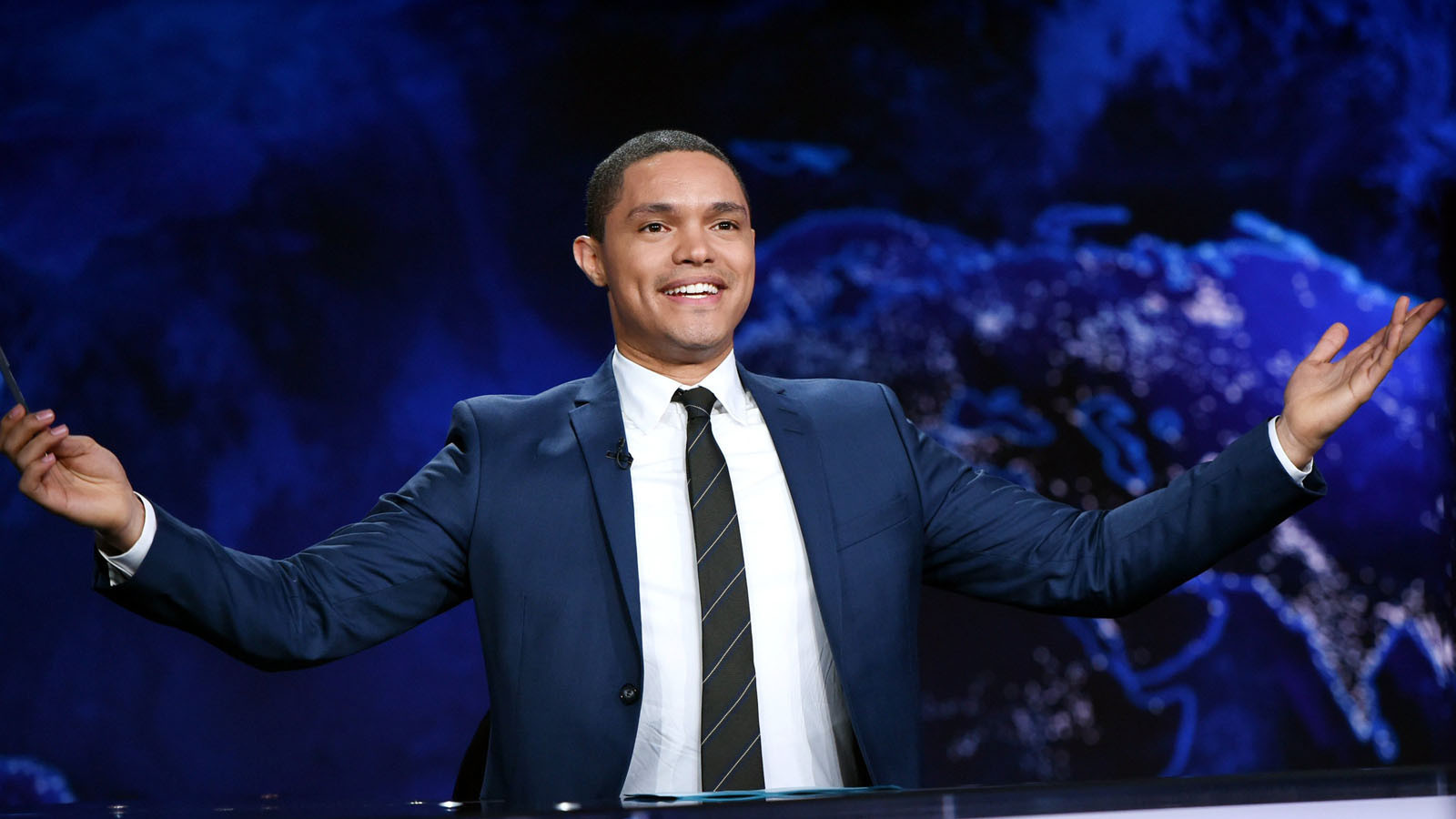
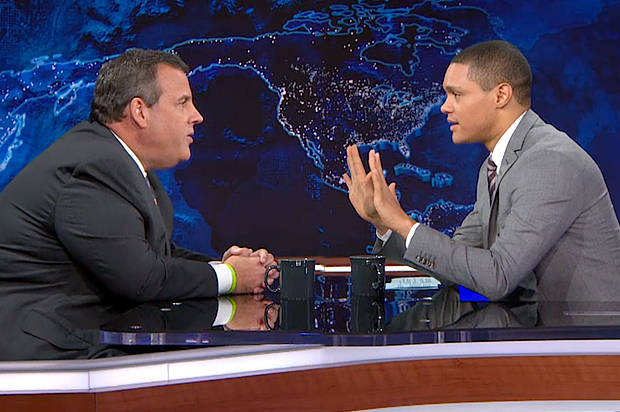
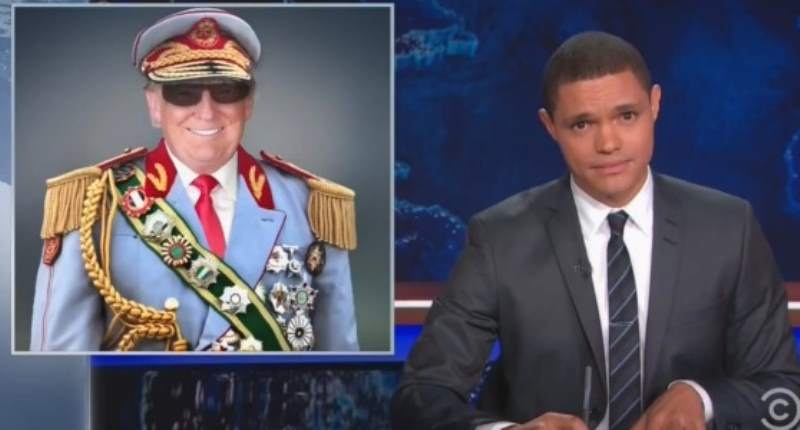

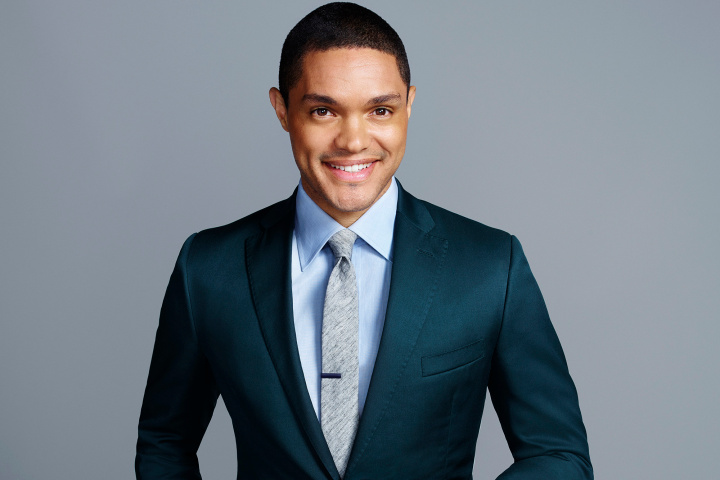
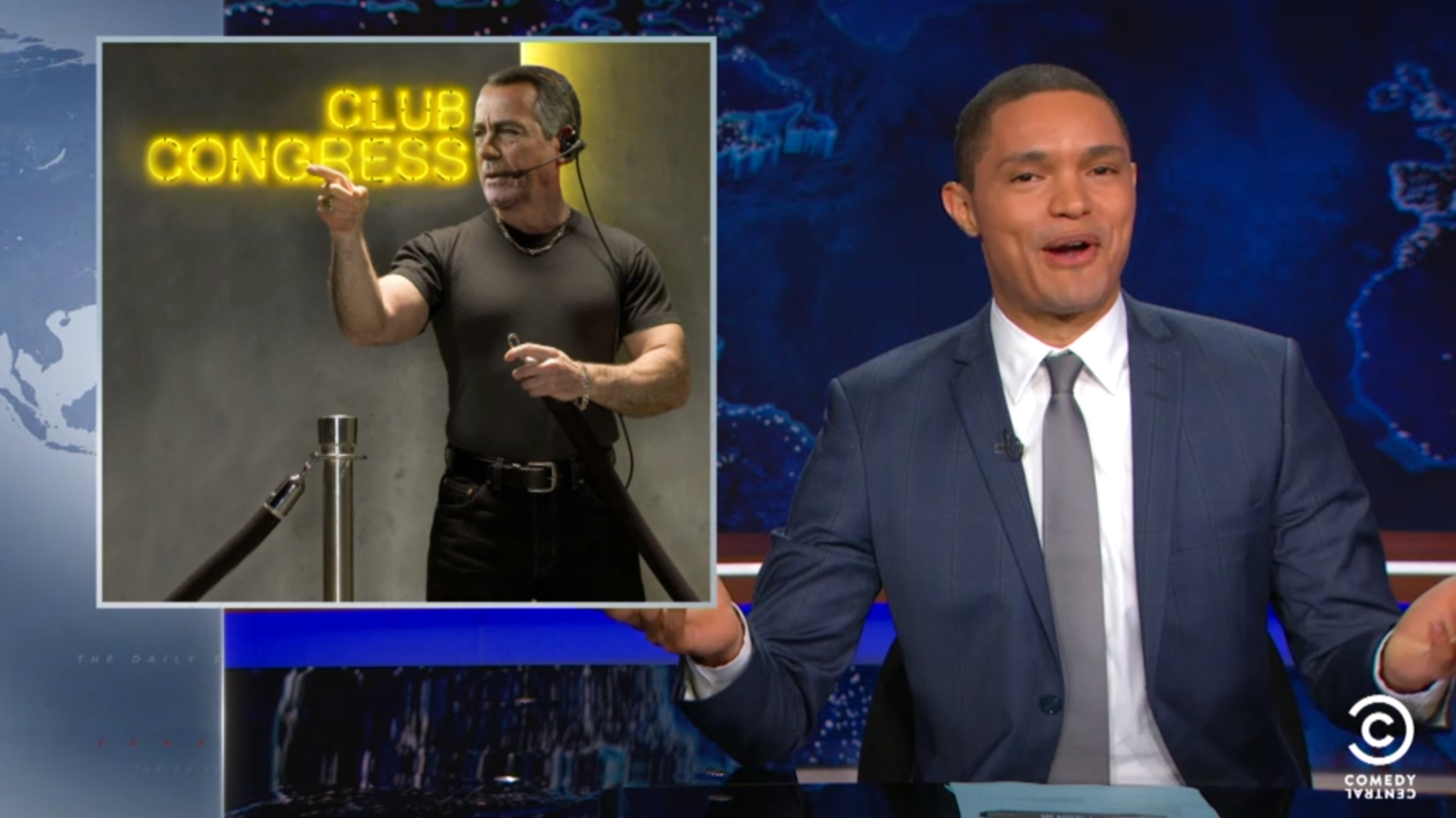


The Daily Show truly has become more than the personality and skills of its host.